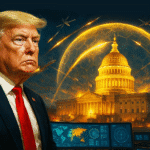In the high-stakes theatre of Middle East diplomacy, conventional wisdom has long dictated that success belongs to those who speak the language—both literally and figuratively—of protocol, patience, and policy. Seasoned diplomats, armed with Ivy League degrees and decades of fieldwork, have shaped U.S. foreign policy in the region through formal channels and calculated restraint. And yet, the results have often fallen short: stalled peace processes, shattered trust, and hardened blocs that resist reconciliation.
Enter Steve Witkoff—real estate magnate turned U.S. Special Envoy to the Middle East under President Donald Trump. To many, Witkoff’s appointment appeared at first to be another outlandish Trumpian experiment: appointing a luxury developer with no foreign policy background to navigate the world’s most combustible geopolitical landscape. But that outsider status may be precisely what makes him effective.
Where diplomats have been constrained by red tape and ideology, Witkoff operates as a blunt instrument of transactional diplomacy. He is not interested in building careers within the State Department, nor is he beholden to decades of doctrine. He brings to the table what has been missing: access, urgency, and the singular goal of closing the deal.
Witkoff’s strengths lie in his unorthodox approach. Known in real estate circles as a bold risk-taker with an eye for distressed properties, he has built a career on salvaging what others wrote off. His acquisition of the long-abandoned Fontainebleau project in Las Vegas and its planned resurrection as The Drew—named after his late son—is emblematic of his ability to inject life into failed ventures. Could this same instinct serve him in rebuilding trust across fractured Middle Eastern alliances?
Critics scoffed when it emerged that Witkoff prepared for his diplomatic role not through academic briefings, but by watching documentaries on Netflix and seeking insights from private briefings and personal contacts. But this critique misses the point. Witkoff isn’t claiming to be a scholar of regional history. He is positioning himself as a negotiator—a closer—who views peace as a practical outcome rather than an ideological pursuit.
In this regard, he aligns perfectly with the Trump administration’s ethos: favouring deal-making over deliberation. The Abraham Accords were not the result of academic theorising; they were born of strategic alignment and direct engagement between power brokers. If Witkoff succeeds in helping broker a lasting ceasefire between Israel and Hamas, or in facilitating economic normalisation between rival factions in the region, it will be because he treated diplomacy like business: assess the stakeholders, identify mutual incentives, and don’t let legacy constraints get in the way of a breakthrough.
Moreover, his close personal relationship with Trump is more than symbolic. In diplomacy, access is power. Witkoff enjoys a level of influence that many career diplomats can only dream of. He can pick up the phone and get the President’s ear—a capability that gives him unmatched agility in a region where timing often determines outcomes.
Of course, there are real risks. Diplomacy is not a property deal. Missteps can trigger escalations, alienate allies, or unravel years of careful engagement. Witkoff’s success will depend on whether his instincts can adapt to the cultural and political nuances that define the Middle East. But it’s worth remembering that the status quo hasn’t delivered either. Endless summits and white papers have too often resulted in stalemates.
The Middle East doesn’t need another strategist who plays not to lose. It needs a negotiator who’s willing to try something different—who can talk directly to power and isn’t afraid to walk into a room with only a handshake and a bold proposition. That may be Steve Witkoff’s greatest asset.
Sometimes, the solution doesn’t come from the system. It comes from the outside. And in a region that has long resisted conventional diplomacy, perhaps that’s exactly what it takes to win peace.













